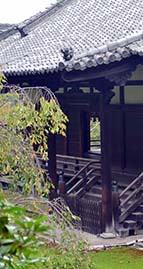Jodo Wasan 58
Encouraging the beings of the ten quarters with the words,
'With sincere mind entrust yourselves and aspire for birth,'
Amida established the Vow beyond conceptual understanding
And made it the cause of birth in the true and real fulfilled land.
Shinjin
The core of the Primal Vow is found in the Larger Sutra as the eighteenth Vow of Amida Buddha.
If, when I attain Buddhahood, the sentient beings of the ten quarters, with sincere mind entrusting themselves, aspiring to be born in my land, and saying my Name perhaps even ten times, should not be born there, may I not attain the supreme enlightenment. Excluded are those who commit the five grave offenses and those who slander the right dharma.1.

In these verses, which praise the content and significance of the Larger Sutra, we discover with great clarity and precision just how Shinran interprets the sutra. The hymns are pellucid in the way that they give an account of the relationship between the practice (gyo), which is 'saying the Name' (shomyo), and shinjin. There can be no doubt that Shinran seeks to emphasise Other Power (tariki), the Primal Vow (hongan) and shinjin. 'Raise sincere mind, serene entrusting, and desire for birth' is in fact the abandonment of all self-power (including any effort to be born in the Pure Land by recitation of the Name) and the entrusting of ourselves wholly to Amida Buddha.
Sometimes these emphases in Shinran's writing are seen as supporting a devaluation of the practice of saying the nembutsu (shomyo). However, all the evidence points to the fact that, for Shinran himself, saying the nembutsu was a constant activity. Saying the nembutsu was a celebration of relief in responding to the call of the vow of Amida Buddha. This kind of nembutsu is hôon no nembutsu, 'nembutsu of gratitude'.
In the first line of this verse the three aspects of shinjin, which is the essential 'quality' of 'hearing the Name', comprise a single internal disposition - the total abandonment of the self. The third of these, 'desire for birth' (yokusho), implies utter acceptance of the most profound and simplest essential of the Buddha Dharma - nirvana. Shakyamuni was reported to have said, 'I teach suffering and the release from suffering.' The primary reason for following the dharma is a yearning, however vague or ill-conceived, to follow the way out of samsara - to discover ultimate freedom (Sk. moksha).
Full conversion to the dharma does not occur until shinjin is settled. This is because the entire fabric of the dharma is underpinned by the assertion that there is no self. As Dogen Daishi (1200 - 1253) - the founder of Soto Zen - said, 'The Buddha dharma is anatman - not-self'. All Buddhist teachings are cognisant of this proposition and Shinshu interprets it as 'not self-power' - thus transcending some practices which involve self-directed psychological violence. I have always been unequivocal in my conviction that only the teaching of Shinran provides the means by which an ordinary karma-bound person can realise this fact within the mundane circumstances of daily life. It is certainly not well understood at this time. But this fact cannot be avoided forever by those of true heart who genuinely seek the way out of samsara.
'Sincere mind, entrusting and aspiration for birth' is the Buddha's mind imparting itself to beings. That is why acceptance of it breaks into the minds of beings and emerges from the mouth as Namo Amida Butsu.
1: CWS, p. 80. The last sentence is the so-alled 'exclusion clause'. However, in the Kyo Gyo Shin Sho, Shinran demonstrates, by quoting extensively from his spiritual teachers, especially the Chinese Masters T'an-luan (476–542) and Shan-tao (613-681), that the purport of this clause is more cautionary than literal.